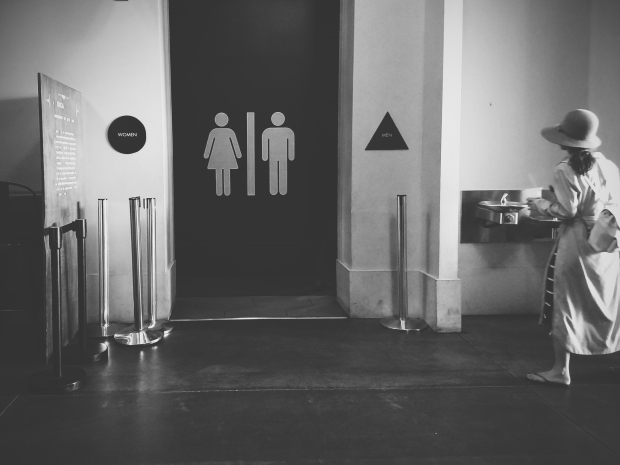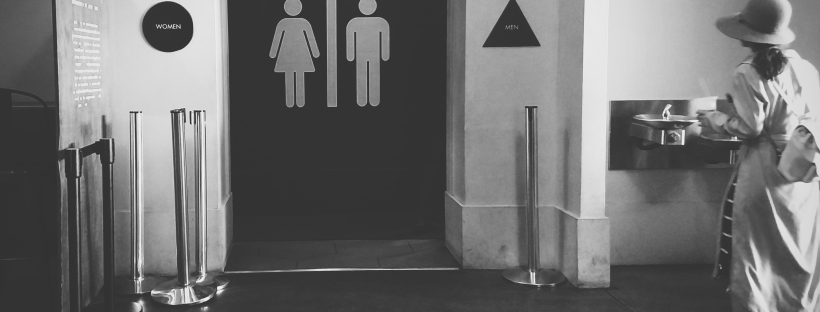Honorary titles, toilets, toy aisles—the landscape of gender is shifting fast, and—you must have noticed—our spoken and written language is transforming right along with it.
He/him, She/her—the old binaries no longer work for everybody, and we’re sliding headlong into a future that feels increasingly not-so-binary.
And that forces to the fore some messy-ass questions.
Such as: Are we entitled to choose the pronouns with which we are addressed? Who decides who gets to be male? Who decides who gets to be female? And what of those who identify as a bit of both, or sometimes neither, and would like that sentiment affirmed by the larger community?
Even in a city like Portland, from what I can tell, plenty of smart, woke people are struggling to abide the semantic messiness of it all.
A few true-life soundbites from recent conversations I’ve had with friends and acquaintances:
“I am so sick of this! If you have a vagina, you’re not a ‘they’; You’re a woman!”
“Referring to one single person as a ‘they’ is grammatically incorrect, and I just can’t do it.”
“What if a human woman decides she identifies as a horse next? Do we have to call her a horse?”
I get the urge to resist the de-binarizing of our language, sort of. In fact, I’ve flirted with a bit of that resistance myself.
***
In case it already feels like ancient history: the contemporary call for mainstreaming gender-neutralism in the U.S. really picked up steam back in the mists of 2016—after Bruce became Caitlyn but before the ascendancy of Trump; before the Ladies Restroom became ground zero for smartphone-fueled Confederate feeding frenzies but well after Harvard began permitting students to register under gender-neutral pronouns.
Circa 2016, a few of my own Facebook friends came out as Genderqueer and publicly announced updated pronoun preferences—radical disclosures which were met with noisy support or just a lot of baffled silence. I also noticed around that time that a few people I knew had begun to list their “preferred pronouns” on business cards and in email signatures: They/Theirs, Z/Zir and They/Their were emerging as alternative singular pronouns for folks who weren’t comfortable categorizing themselves within the He/Him-She/Her paradigm.
These linguistic rumblings begged some big questions for me personally: about grammar, politics, and our culture’s willingness to push forward its own conversation with itself when it comes to sex and gender.
I’ll confess to a few week’s panic. Could something as seemingly innocuous as being called “he” or “she” really be this unbearably triggering for people, or was there something else at work? Was this, as some detractors lamented, plain and simple proof of a generation set hopelessly adrift? Had everybody lost his or her mind?!
I mean, I was willing to do it on a case-by-case basis for people I knew, but did I really have to reconstruct my entire paradigm of pronoun usage? What if I stepped left instead of right and got torpedoed to smithereens for my insensitivity?
And what of the grammatical implications?
I call this my Gender Catastrophism Phase, and it lasted a month or two, at which point I resolved to get over myself and conduct a few linguistic experiments.
I began, as we all should, by shutting up and listening. Reading. Considering. Affirming the perspectives of folks I knew or kinda knew or didn’t know at all, even as I was struggling to understand.
Then, I began adopting They/Their as the default pronoun when referring to anyone whose pronoun preferences weren’t known to me, just to see. Not all the time, but most of the time, when I remembered.
As in: “I met somebody really cool at the convenience store last night, and they bought me a delicious Slim Jim!”
Or: “The barista and I were comparing mug sizes; theirs was way bigger than mine.”
If I were playing in the park with my daughter and we met another parent-child pair, I began trying to remain gender neutral until the parent gave me some guidance on pronouns.
“How old is your little one?” I might ask, and then I’d wait to see which pronoun the caregiver used when answering. Even if I felt positive the child was a boy or a girl. Especially then, I’d remind myself to wait and listen. (And I was definitely surprised once or twice.)
These quotidian adjustments felt awkward and contrived … for about three seconds. And then they didn’t anymore.
Even being corrected on occasion or stumbling over my own attempts at linguistic sensitivity never felt quite so bad as I feared.
Lately, I’m taking the experiment a step further and playing with the use of “they” in place of “his/her” “him/she” in my writing, particularly when dealing with indefinite singular pronouns such as “somebody” and “anybody.” You’ll notice it here on this blog, and you’ll notice it in my other writing, too. If I’m feeling particularly subversive, I might start slipping the neutral pronoun into content writing projects, too.
It goes against everything I was taught about pronouns, but it’s perfectly in line with everything I was taught about how to treat other human beings.
And you know what? Sometimes, it actually simplifies my speech and writing.
Example: instead of invoking dreadfully-cumbersome-though-technically-correct constructions such as: “Has everybody around here lost his or her mind?” I might now simply write: “Has everybody around here lost their minds?”
And that semantic switch, my friends, feels positively liberating.
In summation: my initial fears about embracing gender-neutral pronouns were greatly overblown, and I was also just kinda being a jerk. And if you feel resistant to the premise of retooling your own pronoun use, you’re being one, too.
I get it. You’ve got questions. You’ve got fears. And you’ve got grammar rules drilled into your gray matter that won’t easily come unstuck. So let’s begin by addressing some common objections to the neutral default pronoun.

Q: But what if I make someone feel weird by using “They/Them”?
A.: That’s OK! Sometimes, a person might not want to be called “they” or “them.” Sometimes, that person might let you know so in no uncertain terms and request to be called “he” or “she” or even “Z”, or even for you to stop speaking to them entirely. So be it. When you are made aware of a pronoun preference, simply say, “OK, thanks, noted.” Then get on with your conversation and your life. Yes, there could be more asking and clarifying involved in your daily conversations. Yes, being educated on the matter is humbling and sometimes awkward. It’s part of living in community with other humans, and I promise: (almost) nobody who offers that education is interested in picking a fight.
Q: But people aren’t trying to be insensitive; isn’t this just asking a bit too much them?
A: I get it. Well-intended folk (by which we often mean: cis-gendered, straight-identified, and usually white people) have been at the epicenter of All the Things since forever, and it’s disorienting when that center suddenly jumps left or right. But well-intended folk are plenty smart and capable enough to get with the revised program. People at the center of the traditional gender-and-language paradigm don’t need you to protect them; they need you to encourage them to examine their resistance being corrected or told, “Do it this way; not that way.”
Q: But what if people are asking to be called They/Them just to get attention?
A: So what? If they want attention, let them have attention. Maybe they’re lonely. Maybe they came from a family that actively invalidated every attempt they ever made at constructing an identity that fit, and now they’re finally unshackled from that old nonsense and are exercising their newfound freedom rather earnestly. Maybe they’re figuring stuff out, and sometimes the way we figure ourselves out is by trying on all sorts of identities. Mind your business.
Q: But referring to one person as “they/them” isn’t GRAMMATICALLY CORRECT!
A: I hear you. I feel you. But just as it’s a truism that people change, so, too, does language evolve. Ask a linguist. And if you’re such a stickler for grammar, don’t you feel a leeeetle bit relieved by the premise of casting out that ineloquent, wearying practice of using “he or she” over and over in a conversation or piece of writing after invoking an indefinite pronoun like “anyone” or “someone”? (And if you have no idea what the last sentence means, then you aren’t a grammar stickler, so your complaint is moot.) A neutral pronoun involves zero guesswork, zero thinking. That’s pretty damned neat and clean. It’s democratic, too.
Q: But, seriously. Has everybody around here lost his/her mind?!
A: This silly aphorism rears its dumb, pointy head in the course of just every single discussion of the imagined pitfalls of normalizing gender-neutral pronouns, usually when all other possible objections have been lodged and duly dismantled. Then it’s extrapolated to some extreme case, i.e., the theoretical Horse Woman, poised to come galloping onto the scene and wreak brutal havoc on the very fabric of our society.
Where anything ends is not your concern, and you’re going to exhaust and confound yourself if you keep attempting to cast out that far into the future.
Again, relax. Nobody has lost their minds. I promise.
***
Up for a Challenge? Why not conduct your own gender-neutralism experiment? Try using “they” and “their” in speech or writing, for a week or two, just to see, just to learn.
I’m betting you’ll soon agree: it really isn’t so very hard at all.

